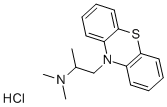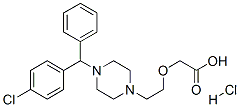A6832112
Promethazine hydrochlorine , >98.0%(HPLC) , 58-33-3
Synonym(s):
10-[2-(Dimethylamino)propyl]phenothiazine hydrochloride;Promethazine hydrochloride
CAS NO.:58-33-3
Empirical Formula: C17H21ClN2S
Molecular Weight: 320.88
MDL number: MFCD00012652
EINECS: 200-375-2
| Pack Size | Price | Stock | Quantity |
| 25G | RMB225.60 | In Stock |
|
| 100G | RMB764.00 | In Stock |
|
| others | Enquire |
Update time: 2022-07-08
PRODUCT Properties
| Melting point: | 230-232°C |
| Flash point: | 9℃ |
| storage temp. | 2-8°C |
| solubility | Very soluble in water, freely soluble in ethanol (96 per cent) and in methylene chloride. |
| form | Solid |
| color | White to Almost white |
| PH | pH (50g/L, 25℃) : 4.0~6.0 |
| λmax | 297nm(H2O)(lit.) |
| Merck | 14,7786 |
| BRN | 4166397 |
| BCS Class | 1,3 |
| InChI | InChI=1S/C17H20N2S.ClH/c1-13(18(2)3)12-19-14-8-4-6-10-16(14)20-17-11-7-5-9-15(17)19;/h4-11,13H,12H2,1-3H3;1H |
| InChIKey | XXPDBLUZJRXNNZ-UHFFFAOYSA-N |
| SMILES | N1(CC(C)N(C)C)C2C=CC=CC=2SC2=CC=CC=C12.Cl |
| CAS DataBase Reference | 58-33-3(CAS DataBase Reference) |
| EPA Substance Registry System | Promethazine hydrochloride (58-33-3) |
Description and Uses
Promethazine is a first generation histamine H1 receptor antagonist (Ki = 2.6 nM) whose antihistamine activity has been reported in guinea pigs and mice at ED50 values of 0.43 and 5.9 mg/kg, respectively. Promethazine can penetrate the CNS, depressing central H1 receptor activity, which may relate to its sedative properties, and can also inhibit muscarinic acetylcholine receptors (Ki = 22 nM). Furthermore, 32 mg/kg promethazine demonstrates antiemetic effects in ferret models of motion sickness or chemotherapy-induced nausea.
Safety
| Symbol(GHS) |    GHS05,GHS07,GHS09 |
| Signal word | Danger |
| Hazard statements | H302-H317-H318-H411 |
| Precautionary statements | P261-P273-P280-P301+P312-P302+P352-P305+P351+P338 |
| Hazard Codes | Xn,N |
| Risk Statements | 22-36/37/38-51/53-43-20/22 |
| Safety Statements | 26-36-61-60-36/37/39-28-22 |
| RIDADR | UN 2811 6.1/PG 3 |
| WGK Germany | 3 |
| RTECS | SO8225000 |
| HazardClass | 6.1(b) |
| PackingGroup | III |
| HS Code | 29343000 |
| Toxicity | LD50 i.v. in mice: 55.0 mg/kg (Rajsner) |




